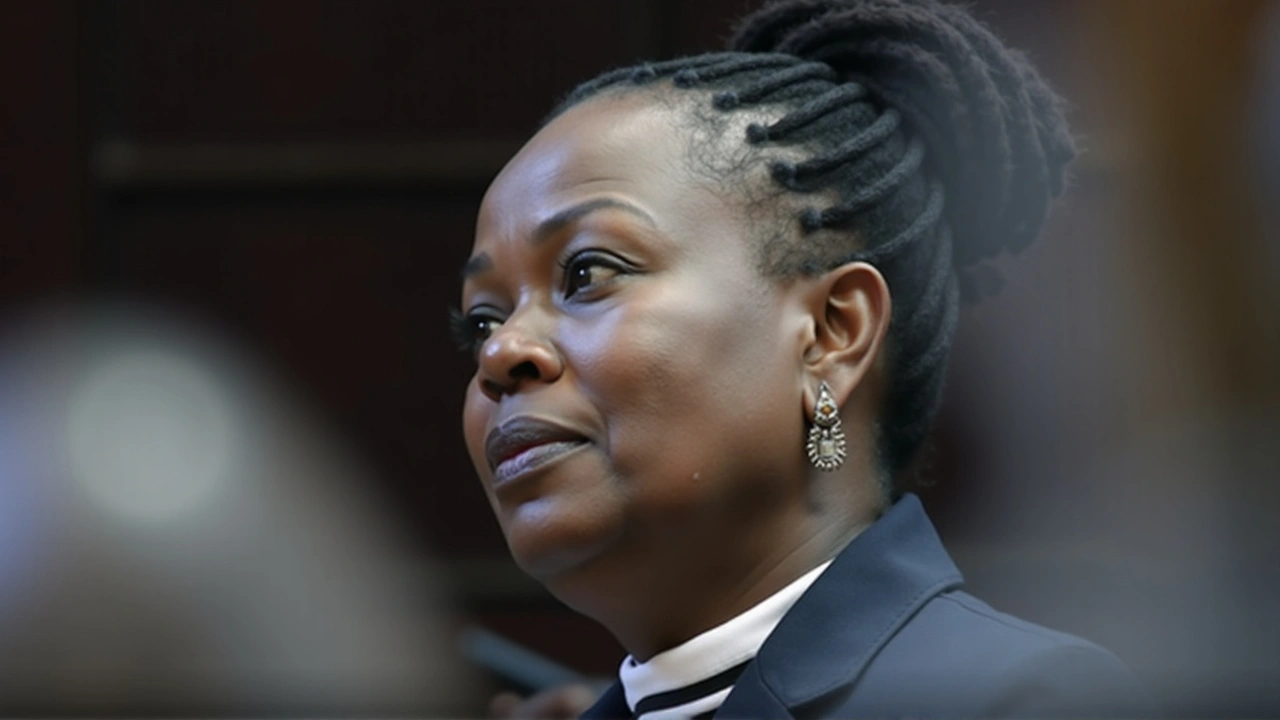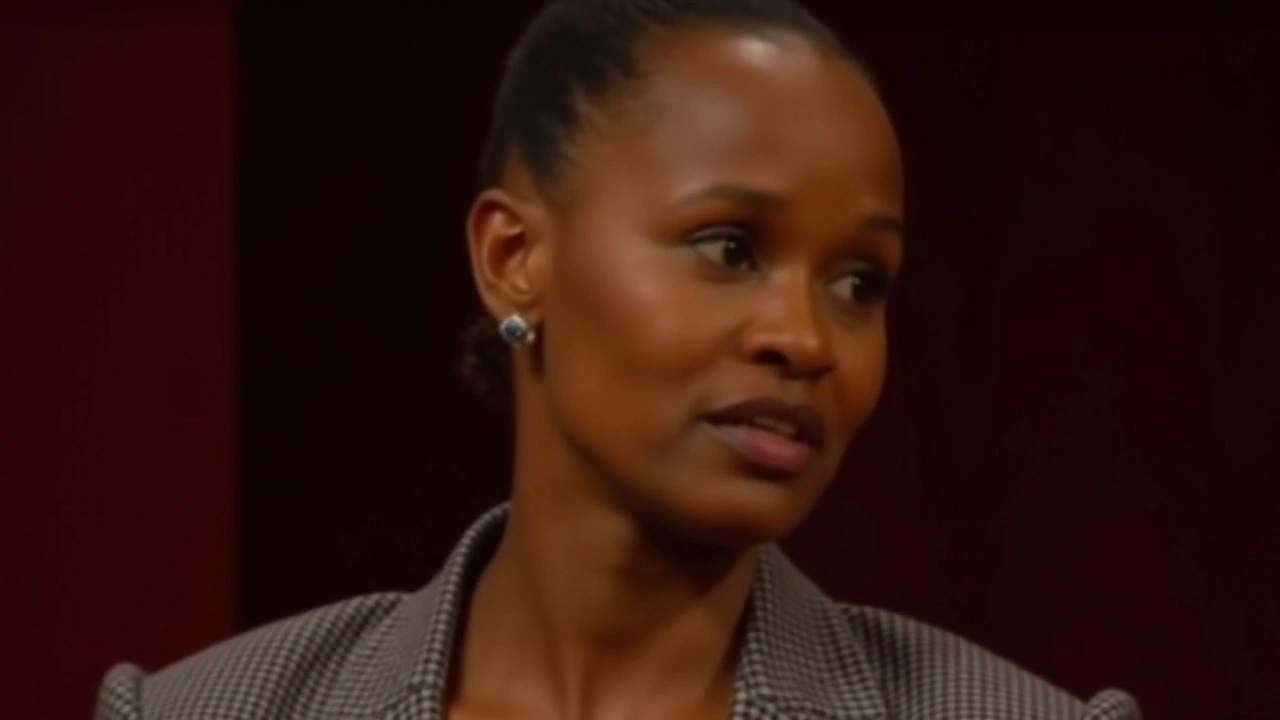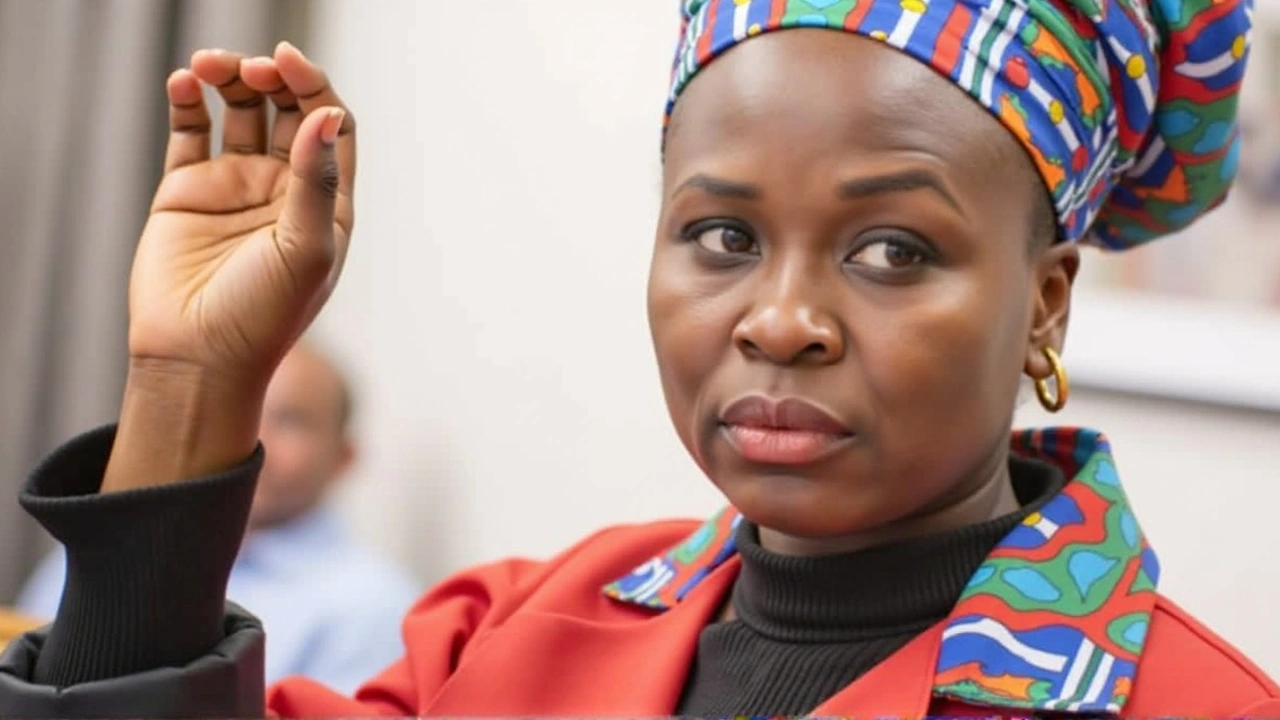Busisiwe Mkhwebane's Legal Battle for R10 Million Gratuity
Busisiwe Mkhwebane, the former Public Protector of South Africa, has returned to court in an urgent bid to secure a R10 million gratuity payout. Her legal team, headed by the well-known advocate Dali Mpofu, argues that the Office of the Public Protector is legally bound to provide her with this payment. Mkhwebane's entitlements have come under the scrutiny of the court, with her lawyers asserting that any denial of this gratuity would be arbitrary, cruel, and degrading.
The backdrop of this case centers on Mkhwebane’s financial struggles, which she has brought to light in her appeal. Since transitioning to her new role as a Member of Parliament (MP) for the Economic Freedom Fighters (EFF), she has noted a significant reduction in her earnings. According to her legal representatives, Mkhwebane's current financial situation only underscores the necessity and urgency of receiving the gratuity that is allegedly owed to her.
Legal Arguments and Public Scrutiny
Dali Mpofu, leading Mkhwebane's defense, has crafted a compelling case focusing on the legal obligations of the Office of the Public Protector to honor what they claim is an owed gratuity. This dispute is not merely a matter of back pay, but a reflection of fairness and due recognition for Mkhwebane’s service in her former role. The stakes are high, and the argument hinges on interpretations of existing contractual obligations and legal precedents.
The argument from Mkhwebane's legal team is straightforward yet powerful: not compensating the former Public Protector as stipulated would constitute an arbitrary and unjust act. They assert that this would set a dangerous precedent, potentially affecting future office-bearers in similar positions. The argument also extends to moral grounds; denying her this entitled financial support amid her current financial woes would be perceived as an act of neglect and disrespect for her years of service.
Public Reaction and Financial Reality
Public response to Mkhwebane's plea for a R10 million payout has been mixed. Some view this as a justified claim deserving immediate resolution, reflecting fair recompense for her work as the Public Protector. Others criticize the request, highlighting the broader socio-economic challenges within South Africa and questioning whether such a gratuity is prudent or necessary.
Mkhwebane's financial struggles are not an isolated concern but part of a broader narrative about the economic realities faced by many South Africans transitioning from public service to new roles with different financial dynamics. Her transition to the EFF brought with it a visible reduction in income, further highlighting the steep financial disparities many face when leaving high-profile public positions.

The Role and Responsibilities of the Public Protector's Office
The Office of the Public Protector plays a crucial role in South Africa's institutional framework, tasked with investigating misconduct in state affairs, among other responsibilities. The legal obligations of this office, especially when it comes to financial matters involving its former employees, are now under the judiciary's scrutiny. Ensuring that rightful gratuities are honored is fundamental to maintaining the credibility and operational integrity of the Public Protector's Office.
As the court proceedings continue, the key legal question revolves around what the contractual and statutory obligations are for the office. This case could set a precedent for how gratuities are handled in the future, not just for the Office of the Public Protector but potentially for other public institutions.
Implications for Future Office-Bearers
The outcome of this court case may have wide-reaching implications. It seeks to clarify and possibly redefine the financial and legal entitlements of high-ranking public officials after their terms. Would a favorable judgment for Mkhwebane mean increased financial security for those who follow in her footsteps, or could it prompt a reassessment of how such entitlements are structured and granted?
Through this lens, Mkhwebane’s case transcends her individual plight and enters a broader conversation about legal and financial protections for public servants. The judiciary's ruling may provide guidance or mandates for thoroughly reviewing the contractual clauses governing farewells to office.

Court Proceedings and Future Outlook
The court is expected to deliberate further, with both sides presenting detailed arguments and evidence. As observers keenly follow the events unfolding in the courtroom, the verdict will be awaited with much anticipation. The gravity of this case is not lost on the public, who are aware of the possible rippling effects of the decision.
As the deliberations move forward, the focus will stay on the comprehensive legal arguments laid out by Mkhwebane’s team, coupled with the rebuttals from the Office of the Public Protector. The tension between legal interpretations, contractual obligations, and perceived fairness remains at the heart of this engrossing court battle.
This extended court case and its ultimate resolution will undoubtedly attract significant media attention, shaping public perception and conversations about justice, fairness, and recompense in public service. It underscores the profound intersection of law, personal struggle, and public interest in modern South African society.

14 Comments
Ronda Onstad
August 20 2024
Look, I get that she worked hard, but R10 million? That’s a small country’s annual budget for rural health clinics. She’s now an MP-she’s got a salary, benefits, security. This feels less like justice and more like entitlement dressed up as principle. I’m not saying she doesn’t deserve something, but this? It’s tone-deaf in a country where millions are choosing between food and medicine.
Steven Rodriguez
August 21 2024
Let’s be real-this whole thing is a distraction. The Public Protector’s office was supposed to be a watchdog, not a goldmine for ex-employees. If she was doing her job right, she wouldn’t need a seven-figure payout to survive. And let’s not forget who funded her salary while she was in office-taxpayers, many of whom can’t afford to fix their roofs. This isn’t a human rights issue-it’s a corruption echo chamber.
South Africa doesn’t need more people lining their pockets under the guise of ‘service.’ We need accountability. And if she’s broke now, maybe she should’ve invested her earnings instead of chasing political theater.
Ashley Hasselman
August 23 2024
Oh wow. A woman who got fired for corruption is now begging for ten million because her new job pays less? Shocking. Next she’ll sue for the emotional trauma of having to actually work for a living. 💅
Jess Bryan
August 25 2024
They’re all in on it. The EFF, the courts, the media-this is a staged performance to legitimize her as a martyr. The R10 million? It’s a front. The real goal is to launder her reputation and get her back into power under a new title. Watch how fast the narrative flips if she loses. She’ll become a ‘victim of systemic oppression’ overnight.
They’ve been preparing this for months. The timing? Perfect. Just before elections. The money? Not hers. It’s a political slush fund in disguise. You think she’s broke? She’s got offshore accounts and a dozen shell companies. They just want the public to feel guilty so they can keep the machine running.
Zara Lawrence
August 27 2024
One must question the propriety of such a substantial financial claim, particularly when the institution in question is constitutionally mandated to operate with fiscal prudence. The precedent set here could engender a cascade of litigious claims from former office-bearers, thereby destabilizing the very fabric of public accountability. One wonders whether the legal team has adequately considered the implications of conflating personal hardship with institutional obligation.
Moreover, the public perception of the Public Protector’s Office is already under siege; this litigation, however justifiable it may appear on the surface, risks further eroding institutional credibility. One must ask: Is this truly about justice-or about the consolidation of personal power under the banner of moral righteousness?
Kelly Ellzey
August 28 2024
Okay, but… can we just pause for a sec? She’s a woman who fought corruption in a system that tried to bury her, got impeached, lost her income, and now she’s asking for what she was promised? And people are mad? 🤔
Let’s not forget-she didn’t steal. She didn’t take bribes. She tried to hold people accountable in a country where that’s basically a death sentence. Now she’s broke? And we’re calling her greedy?
I’m not saying ten million is easy money-but if the contract says she gets it, then she deserves it. And if we’re punishing people for trying to do the right thing? We’re not fixing the system-we’re just making it worse.
Also-why are we so quick to shame women who ask for what they’re owed? Would we be this loud if it was a man? 🤔
maggie barnes
August 29 2024
lol she’s broke? so was i when i was cleaning toilets after my dad died. guess what? i didn’t go crying to the courts for 10 million. she’s a politician, not a charity case. also-she was impeached for corruption. not ‘misunderstood’. for corruption. like, actual, documented, court-proven corruption. so now she’s a martyr? please.
the real crime here is that people still believe her. 🙄
Lewis Hardy
August 30 2024
I don’t know if she deserves the money, but I know this: if you’re going to create a position that carries enormous power and risk, you owe the person who holds it some dignity when they leave. She wasn’t just a bureaucrat-she was a lightning rod. People hated her. Threatened her. Tried to destroy her career. Now she’s in a lower-paying job and suddenly the state wants to wash its hands?
I’m not saying R10 million is fair. But if the contract says it’s owed, then honor it. Not because she’s a saint-but because institutions that break promises don’t survive. And if we’re okay with that? Then we’re not building justice. We’re building fear.
Also-how many people here have ever held a job where your life was in danger because you did your job right? I’m not defending her politics. I’m defending the principle.
Prakash.s Peter
September 1 2024
One must observe that the assertion of contractual entitlement is predicated upon a flawed interpretive framework-namely, the conflation of statutory obligation with moral compensation. The Office of the Public Protector, as an institution, operates under a fiduciary mandate-not a welfare function. To grant such a sum is to institutionalize impunity for the politically connected. Furthermore, the assertion that her transition to parliamentary service constitutes financial hardship is empirically dubious: MPs in South Africa receive salaries exceeding R1.5 million annually, plus benefits. One wonders whether this litigation is not merely a strategic maneuver to deflect from prior misconduct.
ria ariyani
September 1 2024
WAIT-so she’s now an MP and STILL asking for TEN MILLION?!!? 😭😭😭
THE AUDACITY. THE DRAMA. THE. TRAGEDY.
She’s literally a villain in a Netflix docuseries and now she’s playing the victim? I’m crying. Not for her-for the country. This is why SA is broken. We reward chaos. We glorify the mess. We turn corruption into a cult. 🙏💔
Also-did she get a Tesla? Did she buy a mansion? Did she pay her lawyers in gold? I need to know. I need to feel this.
Emily Nguyen
September 3 2024
This is classic institutional capture. She was appointed to root out corruption, then became the poster child for it. Now she’s weaponizing her own ousting to extract a financial windfall. The legal argument is a smoke screen-what they’re really doing is normalizing the idea that high-level public officials should be compensated like corporate CEOs after leaving office. That’s not justice. That’s crony capitalism with a constitutional veneer.
The real issue? The system rewards loyalty over integrity. If she’d played nice with the ANC, she’d still be in power. But she tried to hold the powerful accountable? Now she’s broke? Nah. She’s just the wrong kind of whistleblower. And now she’s trying to monetize her martyr complex.
Ruben Figueroa
September 4 2024
Ohhhhh sweetie. 😒 You think this is about justice? Nah. This is about legacy laundering. She’s got a cult following now-fans who think she’s the only one who ‘stood up.’ Meanwhile, real people are getting evicted, kids are going hungry, and she’s in court asking for enough cash to buy a private island. 🏝️💸
Also-she got impeached. For lying. Under oath. In a public hearing. And now you’re defending her? 🤦♂️
Stop romanticizing toxic people. She’s not a hero. She’s a cautionary tale with a PR team.
Gabriel Clark
September 5 2024
There’s a deeper question here that’s being drowned out by noise: What does it mean to serve in a broken system? She took on a role that required immense courage, and the system turned on her. Whether you agree with her methods or not, she didn’t run away. She stayed. She fought. And now she’s being asked to pay the price alone.
That’s not a legal issue. That’s a moral one.
If we don’t protect those who try to hold power accountable-even when they make mistakes-we’re telling everyone else: don’t bother. And that’s the real loss.
Not everyone who does right is perfect. But if we only reward the flawless? We’ll never get any real change.
Elizabeth Price
September 6 2024
Let’s not forget: she was removed from office by Parliament, not a court. That means her removal was a political act-not a judicial one. So now she’s suing for money based on a contract that was never legally reviewed? That’s not a legal claim-it’s a political stunt. And the fact that people are buying it? That’s the real scandal. The system isn’t broken. The public is gullible.
Also: ten million? That’s more than the annual budget of most rural municipalities. Are we seriously okay with this? I don’t care if she’s ‘struggling’-she chose this path. Now she’s asking the public to bail her out? No. No. No.